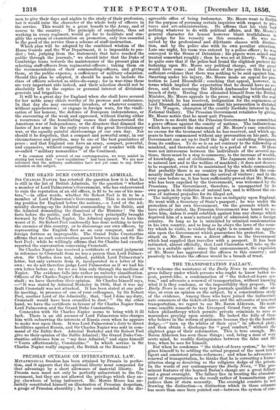THE GRAND DUKE CONSTANTINE'S ADMIRAL.
Sic, CHARLES NAPIER has retorted the question how it is that he is still in the list of British Admirals, by the question " whether a member of Lord Palmerston's Government, who has endeavoured to ruin the reputation of an old officer, is fit to be one of his mas- ters,"—in other words, whether Sir Robert Peel is fit to be a member of Lord Palmerston's Government. This is an interest- ing position for England before the nations,—a Lord of the Ad- miralty showing-up the Admiral commanding in the Baltic, and the Admiral demanding the dismissal of the Minister ! On the facts before the public, and they have been principally brought -forward by Sir Charles Napier, the Admiral appears to have the worst of it. Sir Robert Peel confessedly has done nothing to invite the enemies of this country, or to discourage our own officers, by representing the English fleet as an easy conquest, and the foreign fortress as impregnable. The Grand Duke Constantine affirms that no such conversation passed between him and Sir Ro- bert Peel ; while he willingly affirms that Sir Charles had exactly reported the conversation concerning Cronstadt.
Sir Charles Napier has received a certificate of sound judgment in reference to Cronstadt from no less a person than Lord. Palmer- ston. Sir Charles does not, indeed, publish Lord Palmerston's letter, but only extracts from it, incorporated in a letter of his own : we do not therefore judge Lord Palmerston as if we had his own letter before us ; for we see him only through the medium of Napier. The evidence falls into rather an unlucky classification. Officers of Sir Charles Napier's fleet were impatient to attack Cron- etadt ; we have therefore their opinion. Sir Charles himself says, —" It was stated by Admiral Berkeley in 1856, that it was my fault Cronstadt was not attacked. It has been stated at one pub- lic meeting, in presence of one of your colleagues, by Sir Robert Peel, another Lord of the Admiralty, that, had I done my duty, Cronstadt would have been crumbled to dust.' " On the other hand, we have the certificate in favour of Sir Charles Napier from Lord Palmerston and the Grand Duke Constantine.
Connexion with Sir Charles Napier seems to bring with it ill luck. There is an old accuser of Lord Palmerston who charges him with subserving the interests of Russia even when he appears to make war upon them. It was Lord Palmerston's duty to direct hostilities against Russia, and Sir Charles Napier was sent in com- mand of the Baltic fleet. Admiral Berkeley and Sir Robert Peel give us their opinion of the Baltic Admiral ; the Grand Duke Con- stantine addresses him as "my dear Admiral," and signs himself " Yours affectionately, Constantine." In which service is Sir Charles Napier really engaged, the British or the Russian ?
































 Previous page
Previous page